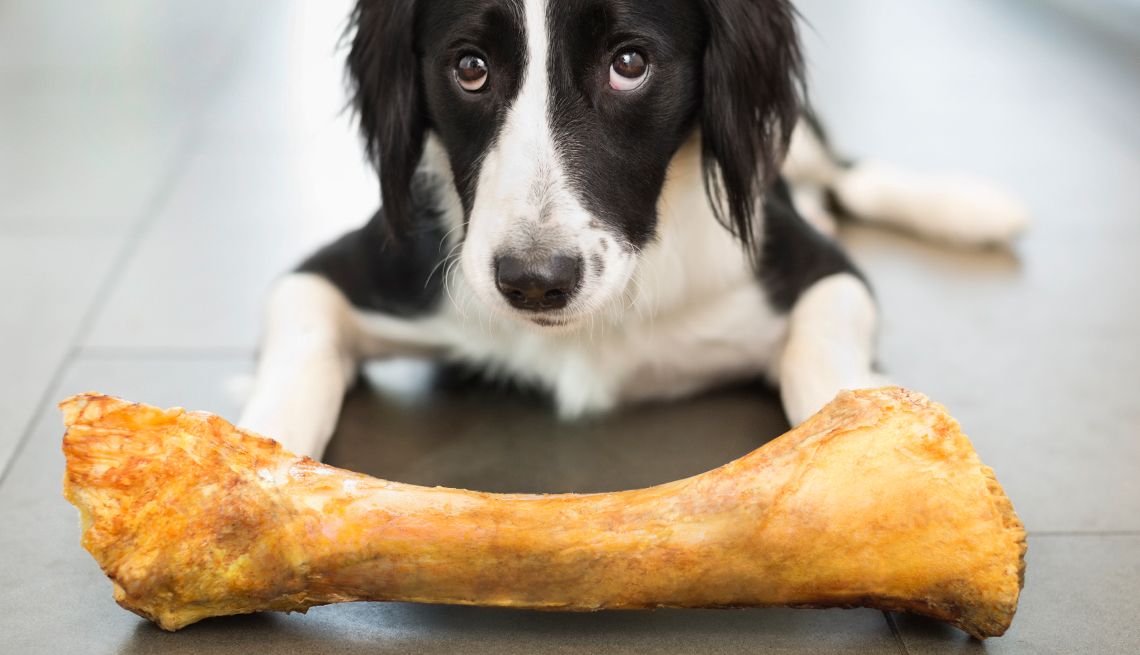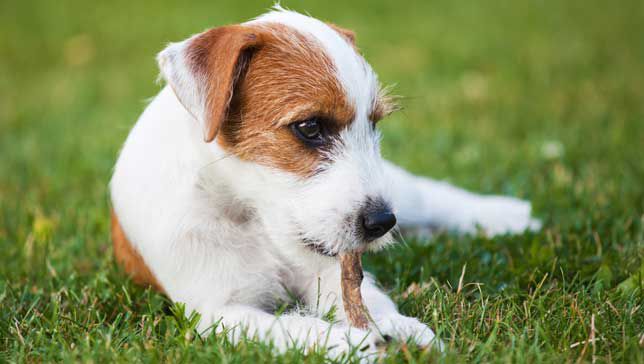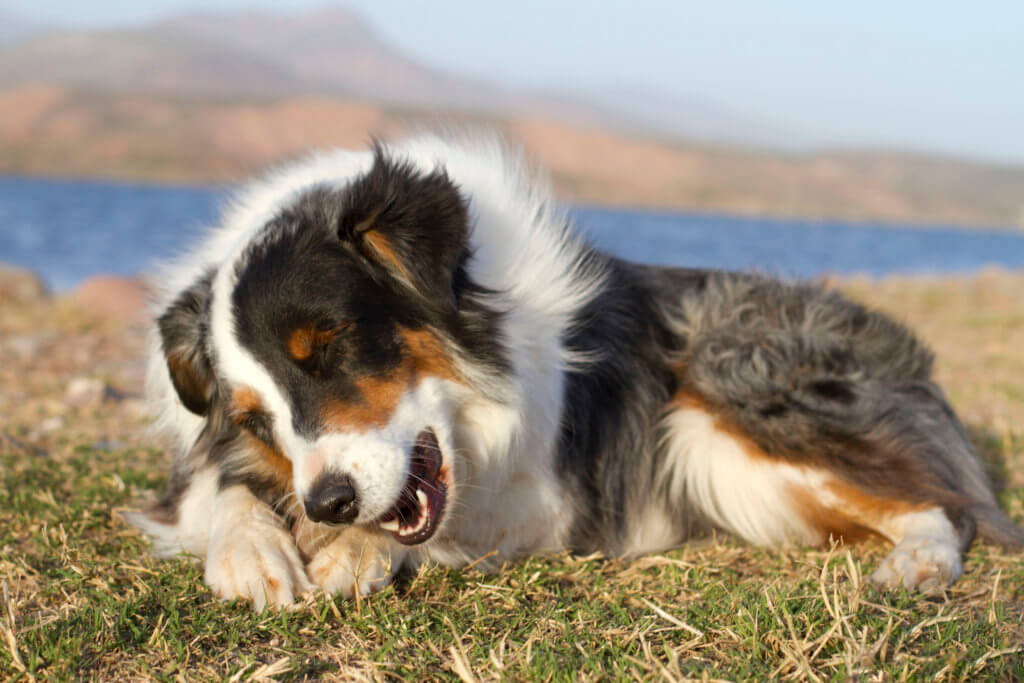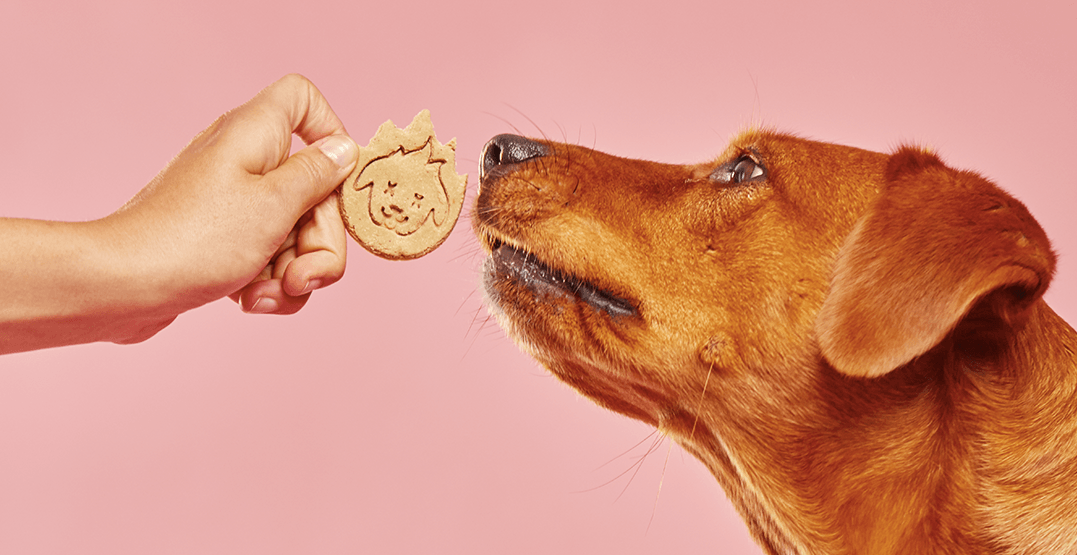Canadians love their dogs, and dogs love their treats! But among the massive selection of chew toys treats out there, there are a few that could prove quite harmful to your dog (not to mention your wallet once the veterinarian gets involved!}. In this article we go over a list of dog treats and toys you should avoid or use with caution, we give a few pointers for finding safe and healthy treats, and recommend of few dog treats of our own your furry friend will love.
Dogs Need Treats and Toys!
If there’s one thing dogs love to do it’s chewing. As every dog owner knows, good chew toys are a must if you want to avoid your puppy chewing up your favourite shoes or other beloved possessions. We also need treats to show dogs our love and to reward them.
Unfortunately, not every chew, treat and toy is made equally. Some of them even pose a danger. Though the list below includes some pretty familiar items which can often be used without incident, it’s important to remember that dogs can be pretty impulsive, impatient and ravenous when it comes to chewing and eating. If you’re thinking of giving your dog any of the treats or chews on this list, make sure you supervise your dog as they enjoy their treat and be aware of the risks!
Dog Treats That May Be Dangerous
Jerky Treats (various brands)
Unless you’re sourcing your jerky locally and can be 100% sure none of the ingredients are harmful, you might want to avoid jerky treats for dogs. Back in 2012, the FDA issued a warning for chicken jerky dog treats made in China. The reason? Apparently the treats were responsible for the death of more than 1,000 dogs.
Pet owners complained that the treats caused a large number of incidences of FLS (Fanconi syndrome) a rare kidney disease, kidney failure and gastrointestinal illnesses. Though retailers Petco and Petsmart stopped carrying the dog treats, many of the treats can still be found in pet stores and online retailers like Amazon.
A “made in Canada” label may not be enough to protect you. Many dog food brands still make jerky treats which include tainted ingredients sourced from China. Until we know exactly what is tainting these treats, it’s best to avoid them.
Greenies Dog Treats
Dogs love these treats and, generally speaking, they are good for canine oral health. However, these can be dangerous for young dogs and dogs that eat too fast. As greenies break easily and are chewy, it’s possible your dog will ingest a big chunk without chewing it properly first, which can lead to choking or punctured intestines. Make sure to supervise your pet when you give them greenies!
Bones
This one is a bit controversial as canines eat bones a-plenty in the wild and are a “natural” chew toy dogs love. Most people believe that so long as the bone is uncooked (cooked bones splinter more easily) and not too small, it should be fine.

You’ll find plenty of people who recommend bones like beef knuckles wholeheartedly. The argument is that bones are natural and provide hours of safe chewing enjoyment for dogs. Wolves eat bones in the wild, so why shouldn’t dogs?
The problem is that bones often splinter, whether they have been cooked or not, yet are often hard enough to break teeth. Splinters can lead to digestive punctures or injuries to the mouth or throat. You won’t hear about wolves dying of splinters in the wild because, well… they’re in the wild. When wild dogs get a bone splinter in their digestive tract the results are painful and potentially terminal. They’re likely to die of pain and infection before they die of hunger.
The fact is, pet dogs don’t need bones. Whereas wild canines eat bones to get calcium and other minerals, among other things, domestic dogs will already get all the calcium they need from a commercially-available dog food.
Even though bones are totally natural, the fact is even the FDA has issued warning to pet owners about them. Although it’s completely true that bones are natural and dogs certainly love them, the risk of injury from bones is much higher than with other treats and chews. If you want to give your dog a bone, be sure to supervise it as it chews and to take the bone away if you see any splinters forming or about to be ingested.
Rawhide Chews
One of the most popular treats for dogs, rawhide chews are typically made from cow hide that’s been stripped of hair, patted down and dried. Though fans of the treat will say that rawhide treats should be safe if purchased from Canadian/American companies, the fact is that many popular brands treat their chews with a slew of chemicals while others have gone through major recalls for salmonella poisoning. Rawhide treats coming from other countries, such as China could also contain dangerous arsenic chemicals.
Rawhide chews are known for being great for decreasing tartar build up on dog’s teeth and giving your puppy something to chew on other than your best shoes, but if you’re going to give your dog a rawhide chew, try to make sure it is 100% free of any chemical that could pose a danger.
Chocolate
Most dog owners are aware that chocolate is toxic to dogs, but if you haven’t heard, it can cause serious health problems—even death. Dogs can experience a potentially fatal reaction to one of the compounds in chocolate called theobromine, which is similar to caffeine. If your dog has developed a taste for chocolate, time to turn it on to a new treat! If you’re dog has ingested chocolate, keep an eye out for the following symptoms: vomiting, shallow breathing and irregular heartbeat.
 Hard Cheese Blocks
Hard Cheese Blocks
Though cheese-based treats can be safe if they aren’t adulterated with cheap ingredients, some do pose a choking hazard or could potentially break teeth. Fortunately there’s any easy “thumbnail test” to make sure they aren’t too hard. If the cheese block isn’t soft enough for you to make an impression with your thumbnail, it’s probably too hard. Though they don’t need to be avoided completely, you’ll want to make sure that the treats aren’t sized in a way that could cause a choking hazard and aren’t so hard they’ll break teeth.
Cow Hooves
It used to be that cow hooves where one of the most popular chews out there. Although they are less popular now, they are still readily available. As with bones and hard cheese, the danger posed by cow hooves is that they crack, splinter and then either injure your dog’s mouth, choke them, or puncture their organs. Hooves do tend to crack more readily, so these are best avoided.
Elk or Deer Antlers
Though these have become quite the rage for being “sustainably harvested” (elk and deer shed their antlers naturally) and therefore natural, they can be quite dangerous. Built to withstand high-impacts with other antlers, antlers are easily hard enough to break dog teeth. They can also be sharp enough to cause puncture wounds. The problem has gotten bad enough that board certified veterinary dentists have issued warnings in an effort to help pet parents avoid the costs of antler-related injuries and spare puppies the pain and discomfort.
Nylabones or Nylon Chew Toys
Hard plastic and hard nylon chew toys, like Nylabones, are just as dangerous to your dog’s teeth as any of the other hard chews/treats mentioned above. The problem with these toys is that they have little to no “give,” and have resulted in many tooth fractures. We mentioned the “thumbnail test” above, the same rule applies to these chews. If your thumbnail doesn’t leave an impression with a firm push, it is likely too hard for your dog’s teeth. What’s worse is that some dogs can still manage to tear these chews into pieces and then swallow them, leading to digestive obstructions.
 Pig’s Ears
Pig’s Ears
Another “natural” chew many dog owner’s have gone for, pig’s ears make for good chew toys as they aren’t too hard for teeth, but there are other problems to consider. Pig’s ears are often coated with substances that can lead to digestive upset, which might mean vomiting in the house. Additionally, pig’s ears can harbour an alarmingly large number of bacteria. What’s more, dogs are usually able to tear these into chunks, which they may then swallow—another choking and digestive obstruction hazard.
Wait! How Many Things Can Fracture Dog Teeth?
To answer this question we’ve turned to Dental Vets. They tell us that the answer is: a surprisingly small amount of force. Yipes!
“Research from 1998 (Duke A) proved the main cusp of an upper carnassial tooth of a 20kg dog will fracture with 90 Kg of force (KgF). This force is very easy to achieve, particularly when the dog bites an object that has no “give” in it. When the sharp cusp of a tooth comes into contact with a toy it has to be able to enter it by a few millimetres if it is not to break. Normally the teeth will be used to cut flesh into strips they can swallow. There are no crushing teeth in the mouth of a dog – hence the problem of providing toys that are hard.”
The Best Kinds of Treats For Your Dog
When shopping for dog treats, you should look for treats that are:
- Grain-free
- Full of nutritional value
- Made from high-quality ingredients
- No preservatives
- No artificial colours or flavours
- Soy-free
If you’re looking to avoid breaking teeth, digestive system obstructions and puncture wounds you can’t go wrong with either a soft-baked treat or a crunchy biscuit treat. Soft-baked treats are often packed with high-quality ingredients your dog will love while being very easy on their chompers. Similarly, crunchy biscuits will pack a nutritional punch, offer flavours dogs love, plus a pleasing crunchy texture. Fortunately there’s no shortage of selection with plenty of local Canadian companies and shops offering all kinds of artisanal and professionally made treats.
Why Are Pet Parents Turning To CBD Dog Treats?
The simple fact is, millions of dog lovers whose pets suffer from arthritis and other conditions have used CBD dog treats to improve their furry loved one’s quality of life. According to American Kennel Club (AKC) Chief Veterinarian, Dr. Jerry Klein, CBD can potentially benefit dogs thanks to its anti-inflammatory properties, cardiac benefits, anti-nausea effects, appetite stimulation, anti-anxiety impact and possible anti-cancer benefits. To learn more about this read our article CBD for Dogs – The Complete Guide.
CBD Dog Treats from Ethical Botanicals make ideal treats for dogs, especially for those that suffer from chronic pain or anxiety. These Alberta-made smoked meat treats are 100% preservative, salt, spice, gluten, GMO, grain and soy free dog treats. Not only are they delicious, they are very healthy too. Rich with iron, collagen, cartilage, calcium, protein and with nutrients not found in meat and bones, such as vitamin B12 and folate (a B vitamin). No fillers or artificial flavours here, just premium CBD isolate (ZERO THC) and MCT oil drizzled on fine ingredients your puppy will love!

